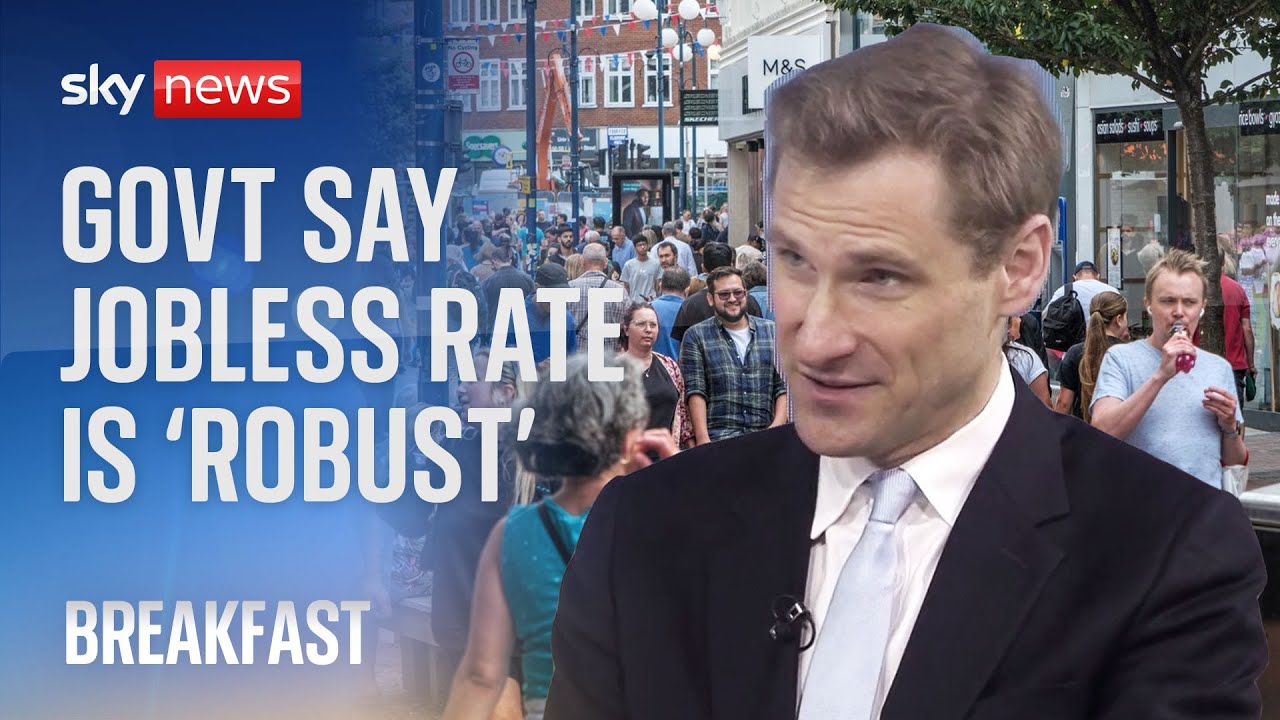Unemployment Rate Is 'Robust' Despite Jobless Increase - Policing Minister
Unleash Your Creative Genius with MuseMind: Your AI-Powered Content Creation Copilot. Try now! 🚀
In 2021, the UK experienced the highest economic growth among all G7 countries. And guess what? They did it again in 2022! That's right, two years in a row with the highest GDP growth in the G7. Talk about a winning streak!
But it's not just the GDP numbers that have people excited. The unemployment rate is also at a record low, almost the lowest in the past 50 years. Despite the challenges posed by the war in Ukraine and other global conflicts, the UK's unemployment figures have remained remarkably robust. In fact, they're even better than many European countries.
But hey, there's still a lot of work to do! That's why the Prime Minister is laser-focused on halving inflation, growing the economy, and cutting debt. It's a tall order, but you know what they say - aim for the moon, because even if you miss, you'll land among the stars.
Cutting Through the Machete Madness
Now, let's shift our attention to a pressing issue: machetes and zombie knives. Yes, you heard me right. We're talking about those scary-looking weapons with no practical use whatsoever. I mean, seriously, what do you do with a double-edged machete or a zombie knife? Aside from causing serious internal injuries, they're mostly used by criminals to intimidate people during street muggings.
So, it's no surprise that the UK government is taking action to ban these weapons. They've been inundated with reports from Members of Parliament citing horrifying cases where people were brutally attacked using these deadly knives. It's time to say enough is enough and say goodbye to machetes and zombie knives for good.
But here's the question on everyone's mind: why did it take 13 years for the government to address this issue? Well, you see, some of these knives were actually banned a few years ago. The UK already has some of the strictest knife laws in the world. In fact, violent crime has decreased by 38% since 2010, according to the Crime Survey of England and Wales. So, it's not like they've been slacking off!
Sure, there may have been a recent uptick in knife crime due to the aftermath of COVID, but let's not forget the bigger picture. Over the past three years, hospital admissions for knife injuries in people under 25 have actually decreased by 24%. That's progress! Of course, there's more work to be done, which is why the government is not only banning these dangerous knives but also increasing the number of police officers.
Voter ID: A Step Towards Secure Elections?
Now, let's dive into a topic that's been causing quite the stir: voter identification. With the local elections just around the corner, the government has decided to implement a new requirement - showing photo ID at polling stations. Some people are scratching their heads, wondering why this sudden change when historically, the UK has never had a problem with voter impersonation.
Well, here's the thing. When it comes to voter impersonation, you can't always detect it in the moment. Currently, anyone can walk into a polling station, state their name and address, and get a polling card. No questions asked. It's a system that leaves room for potential abuse.
Sure, you might think it's excessive to demand photo ID for voting. But let's not forget that there are plenty of instances where ID is required for simple things like collecting a parcel. And guess what? In some European countries, you need photo ID to vote! It's not an unheard-of concept.
But hold on a second. What about the two million people in the UK who don't have photo ID? Are we disenfranchising them? Not at all! The government has made sure to provide a free form of election ID for those who don't have any acceptable forms of identification. They can apply for it, just like I did today (yes, even I had to go through the process). And guess what? Over a thousand people a day have been applying for this free election ID.
Now, I know some skeptics might question the security of the online application process. But here's the thing - you have to input your personal details, including your National Insurance number. And trust me, getting a National Insurance number is not a walk in the park. The government checks all the details against their database, ensuring the integrity of the process. So, it's a far cry from simply walking into a polling station and stating your name.
But what about young people? Aren't they more likely to be impacted by this requirement? Absolutely not! Studies have actually shown that younger people are more likely to have one of the acceptable forms of ID compared to older individuals. So, the idea that young people will be unfairly disadvantaged is simply not true. In fact, it's quite the opposite.
Now, I understand that some people have concerns about specific cards not being accepted as valid forms of identification. But let's remember that there are 20 different forms of ID that are considered acceptable. So, the chances of someone not having any valid form of ID are quite slim.
The bottom line is, ensuring the integrity of the ballot is crucial. Requiring some form of ID to vote in person is a reasonable measure. And let's not forget, 98% of people already have one of the acceptable forms of ID. For the remaining 2%, a free election ID is available. So, let's embrace this change and move towards secure, transparent elections.
It was a pleasure talking with you today. Goodbye for now!
